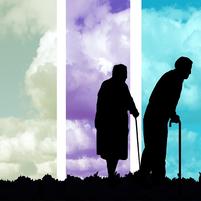This blog reports on a recent research report I completed for a project in Moscow on inequalities in medical care and health status of the elderly, as well as plans for the preparation of an equivalent project report on inequalities in income, education/employment, and the enabling environment. It also outlines the research to be carried out over the next two years for my new Leverhulme Trust Emeritus Fellowship project on The Elderly in Russia, China, and the Koreas: Changing Capabilities and Inequalities.
Over a year ago I decided to follow up a 2017 paper in JPA by studying inequalities of the elderly in Russia. I incorporated this topic into my project on health economics at the Russian Presidential Academy of the National Economy and Public Administration (RANEPA) in Moscow and in June 2019 I completed with a co-author (Ekaterina Pazukhina) Goszadanie (GZ) (State Order) project report: Inequalities in the Capabilities of the Elderly in Russia Related to Medical Care and Health Status and Policy Implications for the National Projects in Demography and Health for 2018-2024.[1]
The GZ report builds on my earlier work on the measurement of capabilities in the elderly: the Human Capabilities of the Elderly in Russia Index (HCER Index), and discusses dimensions of inequalities in the health production process (health inputs, household health-related behaviours, morbidity icebergs, access to medical care and medicines, and health outcomes). These are shown in Diagram 3, which is reproduced below.
The data used in calculating my HCER Index were almost entirely government statistics, but they do not provide sufficient information about the circumstances of the elderly. The Russian Longitudinal Monitoring Survey (RLMS), carried out yearly since 1994, proved to be a rich source of information about the elderly, and was used to supplement official statistics. Our new data allowed us to re-evaluate the HCER Index with two additional years (2005 and 2015), to measure health-related inequalities in the elderly, and also to examine the determinants of health inequalities in some detail. As the report title suggests, we include a preliminary evaluation of inequalities of the elderly related to the two selected dimensions of the HCER Index: Medical Care and Health Status. Because the research was preliminary and written up for a bureaucratic report that is not for public consumption, results are not presented in this blog.
The report concludes with a response to a formal request that academic projects at RANEPA discuss the relevance of their research to the Presidential Decree: On National Objectives and Strategic Tasks of the Russian Federation’s Development in the Period out to 2024 of 7 May 2018, as well as to related national projects. Our research links with the National Project on Demographic Development and the National Project for Healthcare.
The initial four objectives of the Presidential Decree directly concern the elderly: “a) Securing sustained natural growth of the population in the Russian Federation; b) increasing life expectancy to 78 years (by 2030 – to 80 years); c) Securing sustained growth of citizen’s real income, as well as growth of pensions above the level of inflation; and d) Halving the poverty rate in Russian Federation.”
With respect to the National Project on Demographic Development the Decree orders increases in healthy life expectancy to 67 years and in the percentage of citizens leading healthy lifestyles. This will require the implementation of a program for systemic support and increases of quality of life for citizens of senior generations.
In the case of the National Project for Healthcare the Decree sets out the following objectives of relevance to the elderly: (1) Lower the mortality rate from circulatory system diseases (to 450 cases per 100,000 population) and the mortality rate from tumors, including malignant ones (to 185 cases per 100,000 population); (2) Eliminate shortages of personnel in primary medical care facilities; (3) Ensure annual preventive medical examinations for all citizens; and (4) Ensure the optimal availability of primary medical care facilities, including reducing waiting times for citizens. As should be evident, the work of my project on the elderly is closely linked to important objectives of the Russian government.
Later this year, in November, we will complete another Goszadanie report on: Inequalities in the Capabilities of the Elderly Related to the Dimensions of Income Security, Employment and Education, and the Enabling Environment. The report will discuss in general terms the influences on the selected capabilities of the elderly of the factors of gender, education, income, occupation, urban-rural residence, and regions. As with the first Goszadanie report, it makes use of datasets from large-scale surveys as well as official statistics, and it will link its findings to the Presidential Decree and the National Projects in Demography, Health, and Education. Women in Russia (who make up 75% of the elderly) have lower pensions than men, and we will evaluate the causes and consequences of this disparity. We assess the importance of education as a determinant of activities in older age, especially in the labour market, as well as the impact of educational programs to enhance the skills of those over the age of 60, especially in IT. There is considerable interest in Russia in the possibilities of increasing the employment of the elderly in remote regions of Russia with poor labour markets by taking advantage of IT (e.g. outsourcing by Moscow firms of jobs to appropriately skilled older workers in deprived regions, as in the UK outsourcing employment to low-wage India). And finally, Russia’s size and geographical diversity make it essential also to consider urban-rural and regional differences in the provision to the elderly of appropriate transportation and social care to enable them to maintain active lives.
The research on Russia feeds into a new (August 2019 start) Leverhulme Trust Emeritus Fellowship project on The Elderly in Russia, China, and the Koreas: Changing Capabilities and Inequalities. This project will assess the changing capabilities of birth cohorts (e.g. 1940) of the elderly in four countries that have experienced wars and revolutions: USSR/Russia, China, and South Korea/North Korea.
This project will build on my experiences since 2010 of visiting China three times and South Korea five times. The results of my preliminary research on the elderly in South Korea and North Korea were presented in an OIPA seminar in February 2018.
[1] My research project on health economics at RANEPA obtains support from a general pool of funds (block grant) provided to the Academy (university) by the government academic funding council. This is governed by a State Order. All researcher have to contribute to State Order reports twice a year that present their new work in pre-publication form.
About the Author
Christopher Davis is Professorial Research Fellow at OIPA. Since 1991 he has been an academic in the departments of Economics and Area Studies at the University of Oxford and a Fellow of Wolfson College. For the past several years he has been Head, Research Laboratory on the Economics of Health and Health Reform, Russian Presidential Academy of the National Economy and Public Administration. He has carried out research related to demography, health, economic systems, industry and defence related to the USSR and Russia throughout his career.
Comments Welcome:
We welcome your comments on this or any of the Institute's blog posts. Please feel free to email comments to be posted on your behalf to administrator@ageing.ox.ac.uk or use the Disqus facility linked below
Opinions of the blogger is their own and not endorsed by the Institute
Comments Welcome: We welcome your comments on this or any of the Institute's blog posts. Please feel free to email comments to be posted on your behalf to administrator@ageing.ox.ac.uk or use the Disqus facility linked below.













